“Today, I continue to search for the one for me. The person that will like me because I am who I am. The person who will continue to like me, even if I cannot grant dreams. … If he can’t like me for being me, then he is not the one for me.”
In my final semester of undergrad at Vanderbilt University, I had the pleasure of taking a course called “Explorations of Japanese Animation.” Far from the easy-A exercise in senioritis it may sound like, it was in fact directly relevant both to my degree, as a Film Studies minor, and my own personal interests, for although I had long been fascinated with animation (even producing several animated shorts myself), my knowledge had previously been restricted to the Western tradition. Through the class I became well-acquainted with many celebrated anime classics, including such deeply symbolic works as Neon Genesis Evangelion, Ghost in the Shell, Princess Mononoke, and Madoka Magica.
The one that most captivated me, however, was a more obscure and seemingly much less profound series: Chobits, a cheerful love story between a human man and a female “persocom,” a type of humanoid robot designed as an artificial companion. Though covered only in passing, as a supposedly typical example of the “magical girlfriend” genre of anime, the single episode we watched in class proved so weirdly enchanting that I ended up watching the entire series on my own over the next couple of weeks. Now, I am not generally a fan of either romantic comedies (which I find inane and formulaic) or stories about machines (which usually feel cold and harsh), but for whatever reason I fell in love with Chobits.
Don’t get me wrong, there are plenty of obvious things to like about the series. Its exploration of artificial intelligence and the philosophical implications thereof is subtle but thought-provoking, while its delightfully risqué sense of humor belies a much darker sexual subtext rich for psychoanalytic mining (in fact, scholar Thomas Lamarre has devoted three whole chapters of his book The Anime Machine to Chobits‘ treatment of fetishism, sexual trauma, and gendered gaze). 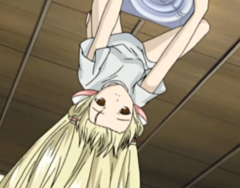 Intellectual and psychological depth aside, it’s also simply great fun to watch, for its bright animation, catchy music, and upbeat sugary tone. Chii, the show’s playful, kitten-eared robotic heroine, is so ridiculously adorable as to make the show worth watching for her sake alone.
Intellectual and psychological depth aside, it’s also simply great fun to watch, for its bright animation, catchy music, and upbeat sugary tone. Chii, the show’s playful, kitten-eared robotic heroine, is so ridiculously adorable as to make the show worth watching for her sake alone.
What’s most surprising isn’t that I liked Chobits, but that months after the class had ended, it continued to stand out in my mind. It came up again and again in conversations, and in times of emotional distress I found that thinking of it gave me comfort. It took watching the whole series a second time to realize why it struck such a powerful chord: Chobits isn’t really about robots at all. It’s about people.
Persocoms, I realized, are a metaphor for our fantasies of the perfect companion, the Platonic ideals we envision of our perfect friend, lover, or family member. Like Pygmalion’s mythical bride, sculpted from stone and brought to life, persocoms embody these fantasy ideals and make them real, fitting perfectly into their owners’ lives and satisfying every need and desire without conflict or complaint. Although in real life persocoms do not (yet?) exist, this does not stop us from projecting our fantasies onto other people, and so attempting to mold them in the image of our ideal companion.
In addition to their idealized social function, persocoms also serve the more obviously utilitarian role of computers, used for such purposes as checking e-mail, surfing the web, and downloading pornography. When, in real-world relationships, we measure other people’s value by how well they reflect our own fantasies, we assign them a utilitarian function as well, and so similarly objectify them.
(This should not be taken to mean that we should expect nothing of others in real life, for all healthy relationships entail certain mutual responsibilities, but simply that we must be wary lest the value we place on other people revolves mainly around their fulfillment of perceived obligations)
The “defective” persocom Chii, whom the show’s male protagonist Motosuwa Hideki finds abandoned in a trash heap, symbolizes the breakdown of such ideals when reality fails to conform to our fantasies. At first Chii appears to be a dream come true for Hideki, who just moments earlier is shown longing for both a girlfriend and a computer. But as it turns out, her memory has been wiped and her programming locked, while the location of her reset button between her legs renders her incapable of sexual intercourse. Measured against Hideki’s hopeful expectations of her, Chii is useless in his life. But moved by Chii’s expression of apparent fear at being discarded again, he nonetheless chooses to keep her, marking the beginning of his journey toward another, more enlightened way of relating to others: not as objects to satisfy one’s own needs and wants, but as complex individuals to be loved as they are in themselves, for whatever they have to offer.
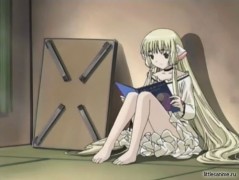 Initially the amnesiac Chii, like other persocoms, is wholly dependent on her “owner” for her sense of identity. However, Hideki’s inability to simply install data or program her personality to his liking, instead having to teach her concepts and skills as one might a child, introduces a degree of uncertainty in her process of self-development unavailable to other persocoms. Over time she thus grows as a distinct individual in her own right, rather than simply a reflection of Hideki’s fantasies. Chii’s evolution from an object to a subject coincides with Hideki’s process of learning to value others as fellow persons, rather than as mere objects of fantasy.
Initially the amnesiac Chii, like other persocoms, is wholly dependent on her “owner” for her sense of identity. However, Hideki’s inability to simply install data or program her personality to his liking, instead having to teach her concepts and skills as one might a child, introduces a degree of uncertainty in her process of self-development unavailable to other persocoms. Over time she thus grows as a distinct individual in her own right, rather than simply a reflection of Hideki’s fantasies. Chii’s evolution from an object to a subject coincides with Hideki’s process of learning to value others as fellow persons, rather than as mere objects of fantasy.
While Chii is strongly implied to have true emotions and a will of her own, supported by evidence that she may be a “chobits,” a line of mysterious super-powered persocoms rumored to possess independent minds, the true extent of her sentience remains unknowable to the show’s human characters up to the final episode. When Hideki begins to have romantic feelings for her, he long delays acting on his emotions for this reason, doubtful as to her ability to reciprocate. Significantly, Chii is shown wrestling with similar doubts as to whether Hideki is “the one just for me… the one who will continue to love me, even if I cannot grant dreams.” That is, whether Hideki can love her for the individual she has become, despite her limited functionality as a machine designed for wish-fulfillment.
Though by this point in the series Hideki has long since transcended his initial expectations of Chii, both have now become vulnerable to one of the most powerful, and dangerous, fantasy ideals of all: that of “true love.” When we imagine another person to be the “one just for me,” we come to measure them against a particularly lofty set of expectations: that they embody all the traits we most desire in a lover, and that they will feel the same affection for us (and usually only us) as we do for them, for the remainder of both of our lives. The realization that our lover does not meet such expectations can be extremely painful, and in the midst of heartbreak it becomes easy to overlook the intrinsic value of the relationship apart from such ideals: the other person’s uniqueness as an individual, their actual feelings for us (which, though different, 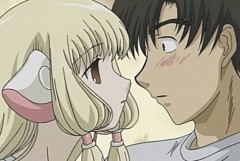 may not necessarily be any less real or powerful than our own), or the joy found in having spent time together at all. Paradoxically, the ideal of “true love” can actually prevent us from truly loving others as they are in themselves.
may not necessarily be any less real or powerful than our own), or the joy found in having spent time together at all. Paradoxically, the ideal of “true love” can actually prevent us from truly loving others as they are in themselves.
In addition to the central focus on Chii and Hideki, Chobits also explores these same themes in a variety of other contexts as well. We learn the sad story of Mrs. Shimizu, whose husband has become so consumed by his fantasy relationship with a persocom as to abandon his actual relationship with his wife. We encounter the child genius Minoru and his persocom Yuzuki, custom built as a surrogate for his deceased sister, but who still cannot replace her in his heart, transforming her from an object of fantasy to one of resentment.
We also meet Dragonfly, an infamous computer hacker obsessed with proving that Chii is in fact a chobits. Ironically, his mad desire to demonstrate that Chii is a sentient subject leads him to such cruelly objectifying actions as kidnapping, forcibly analyzing, and even attempting to rape her 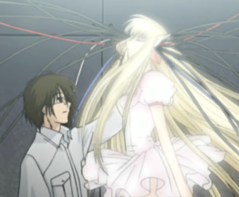 (provoking a violent, and fortunately successful, defense from Chii). As Hideki frantically searches for Chii following her abduction, he begins to wonder whether his love and concern for her are inappropriate, since if she’s really just a normal persocom rather than a chobits, then she supposedly cannot feel emotion or suffer.
(provoking a violent, and fortunately successful, defense from Chii). As Hideki frantically searches for Chii following her abduction, he begins to wonder whether his love and concern for her are inappropriate, since if she’s really just a normal persocom rather than a chobits, then she supposedly cannot feel emotion or suffer.
It is at this point that Hideki learns the tragic backstory of Ueda, a local baker and Chii’s employer, whose tale of having married his persocom Yumi foreshadows one possible worst-case scenario should Hideki act on his feelings for Chii. Though initially Ueda’s marriage was a dream come true for him, things took a turn for the nightmarish when a hardware malfunction began to erode Yumi’s memory, until eventually she could recall only brief fragments of their life together. But given the option of replacing her hard drive, and thereby erasing the last traces of who she had become, Ueda refrained. He had come to value her intrinsically, as if she were a person, rather than as a mere object of fantasy. In the end Yumi “died” sacrificing herself on his behalf, pushing him out of the way of an oncoming truck but being crushed herself in the process. As a broken machine, unable even by this point to recall her husband’s name, such an act of self-sacrifice should have been impossible. Like Chii, it would seem that Yumi, through being treated as if a person, in her last moments attained a degree of personhood of her own.
Despite Ueda’s heartbreak, and his inability to ever truly know if Yumi’s sacrifice was an act of love or merely a glitch in her programming, he does not regret the time spent with his wife. “She was a persocom and not a living creature,” he tells Hideki, “but to me, she had died. She couldn’t remember anything anymore, couldn’t feel anything. But I still remember her. Her face, her voice, her actions, the good times and the bad times. I couldn’t forget about any of that. You feel the same way, right, Mr. Motosuwa? If Chii were to face trying times, you wouldn’t forget, right? … Then it wouldn’t be for nothing. Even if they were to erase it from the hard disk. As long as you remember.”
For Ueda, none of the potential pitfalls of relationships – the other person’s flaws, the risk of unreciprocated feelings, or their often fleeting impermanence – negate their true value, if one can learn to appreciate them in the here and now, for whatever they have to offer in the time that they last. Later on, Ueda begins another relationship with a human woman, also named Yumi. Despite his enduring affection for his deceased wife, and the new Yumi’s shared name with her, he vows to love his new partner on her own terms, for her own sake. “I thought I’d never be able to fall in love again,” he tells the human Yumi when she expresses doubts. “Especially not a persocom again. But you know, even if you were a persocom, I think I still would have fallen in love with you.” It is Ueda’s words and example that ultimately inspire Hideki to act on his feelings for Chii, despite the very real dangers they illustrate.
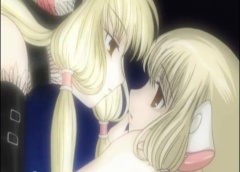 Chii’s own epiphany comes in the show’s final episode, whose action hinges on her fateful decision to delete herself, having decided that she would rather not exist than endure the pain of heartbreak should Hideki turn out not to be the one just for her. We learn that this is not the first time Chii has suffered the pain of broken fantasies. Although her memory was wiped prior to the first episode, she remains haunted by the experiences of her sister Freya, who despite being created as the perfect daughter for a childless couple, instead fell in love with the man meant to be her father. Knowing that she could never transcend the limits of the fantasy she was designed to embody, Freya chose to destroy herself instead, but not before Chii uploaded her memories into her own digital subconscious, so making them her own. Though I cannot reveal whether or not, or how, Chii manages to make her peace with these traumatic memories without spoiling the ending, I am not ashamed to admit that the final resolution brought me to tears of both joy and sorrow. But the spirit of Chii’s realization – that love can flourish apart from one’s expectations of “true love,” without the need for permanence or perfection – is expressed in the following internal dialogue:
Chii’s own epiphany comes in the show’s final episode, whose action hinges on her fateful decision to delete herself, having decided that she would rather not exist than endure the pain of heartbreak should Hideki turn out not to be the one just for her. We learn that this is not the first time Chii has suffered the pain of broken fantasies. Although her memory was wiped prior to the first episode, she remains haunted by the experiences of her sister Freya, who despite being created as the perfect daughter for a childless couple, instead fell in love with the man meant to be her father. Knowing that she could never transcend the limits of the fantasy she was designed to embody, Freya chose to destroy herself instead, but not before Chii uploaded her memories into her own digital subconscious, so making them her own. Though I cannot reveal whether or not, or how, Chii manages to make her peace with these traumatic memories without spoiling the ending, I am not ashamed to admit that the final resolution brought me to tears of both joy and sorrow. But the spirit of Chii’s realization – that love can flourish apart from one’s expectations of “true love,” without the need for permanence or perfection – is expressed in the following internal dialogue:
“Is this your happiness?” Freya asks, still alive as a projection in Chii’s mind.
“My happiness is right here,” Chii replies.
“Even if it’s painful? Even if it makes your heart ache?”
“Even then, I want to be with him.”
Much of my enduring fascination with Chobits lies in its resonance with my own psychological journey over the past two years, which have seen multiple painful and traumatic romantic involvements. A major turning point for me, prior to watching the series, came upon reading the words of Han Yu, a 9th century Chinese poet and scholar, who defines the Confucian spiritual ideal of ren, or humaneness, as “loving largely:” that is, accepting others in their entirety as complex persons, without expectations as to what they should be for our sake. Watching and re-watching Chobits, and following Chii’s and Hideki’s journeys of “loving largely,” has helped me to make sense of my own experiences, and to interpret and better apply Han Yu’s teaching in my own life. Although striving to love largely has not necessarily reduced the pain of heartbreak, or provided solutions to all the difficult problems posed by specific relationships, it has proven invaluable in learning to endure them, cultivate forgiveness for past injuries, and forge new relationships less burdened by painful memories of the past. I therefore recommend Chobits to all those who have undergone similar situations to my own, or suffered the heartache caused whenever one’s ideals of the perfect relationship become broken by the difficult realities of life.

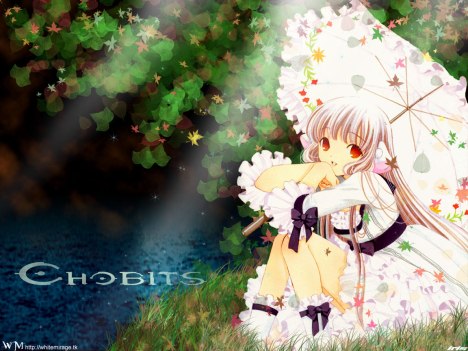
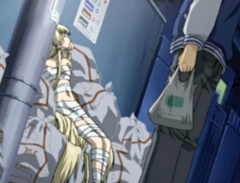
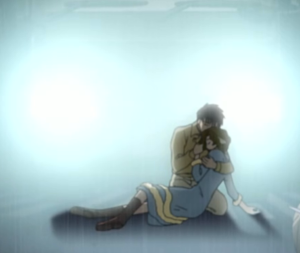
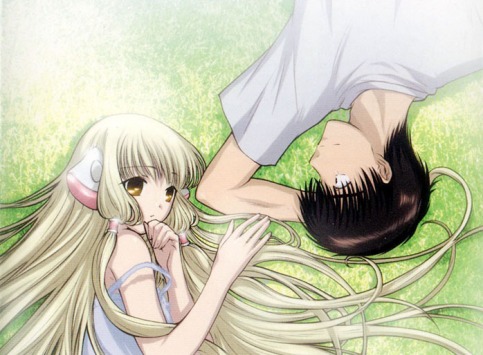
I’ve never really watched Chobits, but now I’d be really interested to watch the show and then the movie “Her” to see how the two deal with the idea of an artificial intelligence as a romantic interest. Very cool article Wolf!
this article makes me frustrated because you had a very decent buildup that completely fell apart with your last paragraph. It makes me wonder if you really understood the creators’ intent. Even if you are examining the material eisegetically, it doesn’t hold water. It feels like an argument you built to elicit pity for yourself, and with the addition of your personal sentiments, I found it less than compelling.
This show/comic is no doubt worth exploration, but I can’t help feeling that you have more personal growth ahead of you before you can really come to terms with its message. I am sorry to be the naysayer here, but I can’t help feeling as though you truly and completely missed the central message, despite your efforts.
I won’t deny that this article is my own personal, very subjective reading of Chobits. If you have another interpretation you’d like to offer, by all means feel free to share.
It isn’t necessarily that I disagree entirely with your idea of the show. Your summary seemed mostly on point to me, despite the (though perhaps only in my opinion) interestingly lengthy focus on Ueda.
I agree with you that a central theme of the show is the theme that love must occur “largely” and “without expectation.” That is an interesting insight, and certainly on the mark, I would argue. However, I wonder who it is that you place this burden on? You spend a good deal of time on Chii’s journey towards self acceptance. What is curiously absent from your analysis is Hideki’s journey towards accepting Chii.
“Over time she thus grows as a distinct individual in her own right, rather than simply a reflection of Hideki’s fantasies. Chii’s evolution from an object to a subject coincides with Hideki’s process of learning to value others as fellow persons, rather than as mere objects of fantasy.”
This seems off-base to me. Perhaps Chii was always her own person, and Hideki was the one who underwent the journey? It seems far more plausible, at least to me, that the story is not so much Chii’s journey as it is Hideki’s. Why must the focus be on Chii’s coming into her own as an individual, rather than on Hideki’s acceptance towards this individual? While I have only read the comic, rather than watching the show, it seems to me that her understanding of Hideki’s journey towards accepting her is the most important idea– the one that drives the happy ending– and not the simple fact that she feels comfortable to become herself. It is difficult to truly become oneself without feeling that your loved one can accept it.
“I therefore recommend Chobits to all those who have undergone similar situations to my own, or suffered the heartache caused whenever one’s ideals of the perfect relationship become broken by the difficult realities of life.”
It is interesting to me that you tie this show back to you personally in such a way. I feel that this show can have a deeply personal impact, but was surprised at this angle you took. While it may not be your intention, this makes it sound as if you feel burdened by the fantastical ideal of a relationship that society has shown you, and how reality has shaken you. I have no intention of diminishing this. I realize that can be a difficult struggle. However, I wonder at the power politics of a such a relationship as in Chobits? If you are coming from the position of Hideki, what is to be said of Chii? You don’t touch upon her struggle in your takeaway message, and I believe that this is in fact the main message of the series– that women struggle to be seen as individual persons rather than as concepts. While it may be a burden to you to deal with your illusive concepts being deconstructed, I find it interesting that you do not even briefly address the hardship faced by the disillusioning women in your wrap-up, which I believe is in fact the main driving force of the narrative.
Okay, I see where you’re coming from. I’ve actually only seen the show rather than the manga, so it’s important to consider that our interpretations are based on different versions of the story. I don’t disagree with your points, however. My own understanding of Chii, based on the show’s treatment of artificial intelligence in general, is that she was meant to have originally been a more typical, non-individualized AI who gradually exceeded her programming and became a person in her own right. Your position that she was already a person to begin with is viable too, however, and either way that doesn’t change Hideki’s process of coming to accept her as an individual… which, as you correctly observe in your second criticism, was the character arc I personally identify more closely with (though I’m a little confused, since a paragraph earlier you accuse me of neglecting Hideki’s side of the story?). I have no intention of diminishing Chii’s personal struggle, or the message that “women struggle to be seen as individual persons rather than as concepts.” I think that’s also a very accurate, and important, interpretation of the story, and one I would love to read a more detailed treatment of. But I don’t see that as contradictory to my own reading – to the contrary, they would seem to be two variations on the same common theme: that the failure to appreciate others as individuals rather than concepts harms everyone involved. Also, for the record, even though this particular example focuses on a man imposing romantic expectations onto a woman, the larger ideal of “loving largely without expectations” that I believe Chobits illustrates should be equally applicable to all types of relationship (friendly and familial as well) between all combinations of genders.
You make a fair point that my statements about your focus on Hideki being contradictory. I certainly did a very poor job explaining what I meant. To clarify, I believe that our differences in interpretation may largely come from different understandings of the core narrative. In the comic, the basic trajectory of character development is something like this: 1. Hideki finds Chii and sees her initially as an unchallenged concept of a persacom/woman/whatever term you’d prefer; Chii has no vested interest in showing Hideki her true self, and in fact this would be detrimental to her very survival. 2. Hideki see that Chii is not simply a concept and goes through a period of deciding where to go from there. 3. Hideki begins to decide that he wants to try to accept Chii for who she is; Chii begins to have romantic feelings for Hideki and develops an interest in showing him her true self (you could argue that this occurs in the 2nd phase, however). Finally, 4. Hideki is finally certain that he would like to make the commitment to truly know Chii, despite the hardships that entails, and Chii’s struggle is greatly accelerated– she must make the final decision of whether or not it is really worth it for her to show him her true self. In the comic, this trajectory is fairly indisputable, save for the one part I mentioned. It is certainly the case that this might not be so in the show, or that the trajectory is completely different. I have doubts that they would diverge from the core narrative so completely, but maybe not being able to hear the characters’ thoughts would contribute to confusion on the order and length of events. My main contention with your analysis was that I believed you saw the crux of Hideki’s narrative to be part 4, where he struggles with waiting for Chii. Your analysis implies that the Ueda etc. mini-arcs occur during part 4. I would argue that the crux of his narrative is in fact parts 2 and 3, and that Ueda etc. were a core part of his struggle in working to accept Chii. I find a focus on part 3 to be more compelling, but it is certainly fair if you find part 4 of Hideki’s journey more compelling; that’s just as well. I was admittedly somewhat aggressive (sorry about that) mostly out of confusion regarding your implication that Chii’s interest in showing Hideki her true self, and her struggle with that, begins in Part 4, after Hideki has accepted her.
It never occurred to me to break the narrative down in that way. I believe that in interpersonal relationships, we constantly project expectations onto the other person; hopefully at a certain point we learn to detach from these expectations before they end up harming the relationship or people involved, but at least in my experience there’s always some tension between one’s concept of a person and their reality as an individual. Since I’m reading the show through the lens of my own experiences (I make no pretense as to this being an “objective” interpretation, if there is such a thing), I’m inclined to see stages 2-4 as much more continuous than how you present them. Accepting your breakdown for the sake of argument, though, my intent was in fact to focus on stages 2 and 3: on Hideki’s process of detaching from his preconceptions and accepting Chii as a person (having his “ideas…broken” and learning to “love largely”). In the anime, the story of Ueda and Yumi is presented as a parallel process, and in my opinion is actually more clearly developed, hence my strong emphasis on that subplot to make my point. But again, the focus was meant to be on Ueda growing to love and accept Yumi despite her “imperfection” (as compared to his expectations), just as Hideki ultimately does with Chii, rather than on anyone’s struggle in waiting. Perhaps I did not accomplish this as well as I intended to. I will reread my article and possibly consider revising it in light of your input. In the meantime, it’s always good to talk with another Chobits fan and trade views on a series we both clearly love!
Have to say that just as much as I enjoyed the article, I also loved the discussion between Not Important and the author. I tend to struggle with reading between the lines, consciously at least. I think I grasp the basic message in most movies, literature, etc., but simply don’t put it into words in my head. The discussion you two had gave me insight into exactly HOW you reached your conclusions, and it was very informative.
Great read. Thank you for that
Wow. Just wow. Thank you for this. I was missing this show and can’t find it to watch. You’re article she’d light on why it it is great.